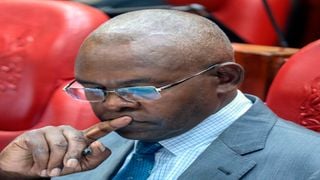
Central Bank Governor Kamau Thugge before the Senate Committee on Finance and Budget at the County Hall, Nairobi on December 4, 2023. PHOTO | DENNIS ONSONGO | NMG
|Business
Premium
Inside Kamau Thugge’s big policy gamble to stop shilling slide
Central Bank of Kenya (CBK) Governor Kamau Thugge on Tuesday took his biggest monetary policy gamble yet with the country’s largest rate increase since 2011, betting on the move to cushion the shilling and keep a lid on inflation.
The review of 200 basis points, which caught market watchers by surprise, mirrors that of Njuguna Ndung’u — now Treasury Cabinet Secretary — in November 2011, when the CBK raised the base rate by 5.5 percentage points to 16.5 percent amid high inflation and a fast-weakening shilling.
Inflation in November 2011 had hit a high of 19.72 percent, while the shilling had weakened to exchange at 106 units to the dollar from 80.86 at the beginning of that year.
In his increase, Dr Thugge cited the shilling as the primary concern, saying that its depreciation has exceeded the level that would have been expected in its correction from recent overvaluation.
The weaker shilling is also posing a debt problem for the government by inflating the shilling value of external borrowings, and raising the cost of servicing these loans.
He is hoping for a repeat of the outcome of the 2011 tightening, which saw the shilling’s exchange rate retreat to 85.20 to the dollar by the end of the year, and inflation fall steadily to touch 6.09 percent by August 2012.
The CBK is banking on the higher interest rates to attract foreign investment inflows, which will in turn improve dollar supply and support the shilling by making hoarding of dollars less attractive. The higher rate should also tighten shilling liquidity, which should help lower demand side inflation.
Economists, however, say that today’s economic conditions — such as high debt and dollar supply problems — mean that a repeat of the clean-cut outcome of 12 years ago is unlikely.
“A high interest rate should ideally attract more dollars and lead to appreciation of the shilling, but it’s more than that; there are other factors that have led to the shilling losing value, one being lower foreign direct investment and, two, less confidence in the economy…the political sentiments are being reflected in the economy,” said XN Iraki, an economics lecturer at the University of Nairobi.
There are also some consequences for the economy arising from the higher rates, key among them a jump in the cost of bank loans as lenders reprice their lending rates to match the higher cost of funds occasioned by the Central Bank Rate review.
Bankers warned ahead of the MPC meeting that a rate increase would lead to mass defaults among borrowers given the situation in the economy.
The lenders are grappling with the deteriorating quality of their loan book, with the industry's non-performing loan ratio rising to 15.3 percent in October from 15 percent in August.
“High rates will lead to less credit and that could slow the economy. Low rates are used as an economic stimulus, but the CBK seems to think inflation is a worse enemy than joblessness,” said Prof Iraki.
Bringing back portfolio investors into the market will also take more than a rate increase, economists warn, given the supply problem that has blighted the country’s forex market.
Investors are sensitive to exit difficulties from an economy due to forex supply issues since this denies them the flexibility and agility needed to take advantage of emerging opportunities elsewhere.
“Portfolio investors will want to see the availability of forex that will allow them to exit smoothly. Unless this is resolved, raising rates will not attract the desired inflows,” said Churchill Ogutu, an economist at IC Asset Managers (Mauritius).
There are also implications for the State in its domestic borrowing programme, where it is already facing elevated borrowing costs on high-interest demands by investors.
The recently sold 6.5-year infrastructure bond is paying investors an interest-free rate of 17.93 percent, a rate which was priced against the previous CBR rate of 10.5 percent, but subsequent bond issuances are likely to attract even higher rate demands, analysts say.
“We can see investors marking up or adjusting their pricing of the debt upwards, especially on the short end of the yield curve. It is unlikely the government will issue long-term bonds since this will be too expensive for the exchequer,” said Ronnie Chokaa, an analyst at AIB AXYS Africa.





